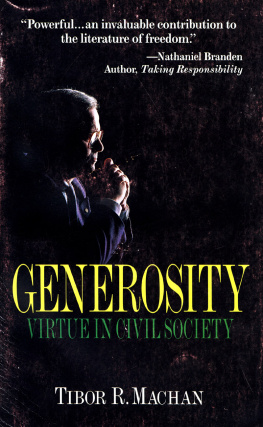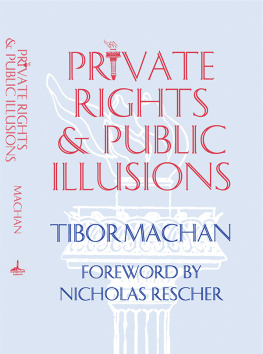Preface
Generosity is a moral virtue that cannot flourish in a welfare state or in any sort of command economy, because to be generous is to voluntarily help others in certain ways. It will, however, flourish in a free society. That is what this monograph will argue and demonstrate.
Generous acts require the right to private property. The point is ancientAristotle argued it nearly 2,500 years ago. But its full import has never been widely enough appreciated. Indeed, many who proselytize for generosity, compassion, kindness, and charity have resisted the establishment of the right to private property as a firm principle of law. For example, the philosopher Thomas Nagel criticized free society as an actual hindrance to generous conduct. As he put it,
Most people are not generous when asked to give voluntarily, and it is unreasonable to ask that they should be. Admittedly there are cases in which a person should do something although it would not be right to force him to do it. But here I believe that the reverse is true. Sometimes it is proper to force people to do something even though it is not true that they should do it without being forced. It is acceptable to compel people to contribute to the support of the indigent by automatic taxation, but unreasonable to insist that in the absence of such a system they ought to contribute voluntarily.
That position is the opposite of the present author's. We shall have occasion to examine it in detail in due course. For now, it needs to be noted that such a view is exceedingly pessimistic and ultimately self-defeating, for what one cannot require of free men and women morally will be impossible to demand of them politically. The system Nagel proposes only provides an excuse for people not to act generously, since their government doesor, more precisely, pretends to doso for them.
Such an outlook injects into political life a spirit not of bona fide generosity but of subterfuge, encouraging moral lethargy and shattered hopes and expectations. One reason the welfare state is often a kind of Hobbesian war of all (special-interest groups) against all is that the ultimately cynical view of human nature Nagel spells out constitutes a good part of the foundation of the welfare state.
The welfare state unabashedly perverts the idea of the right to private property and thus stands as a substantial obstacle to at least one form of human moral intercourse: kindness and generosity among the citizenry. That system has placed its confidence, instead, in forced "charity," wealth redistribution at the point of a gun, which does not by any means encourage goodwill among us. It fosters resentment, bureaucratic inefficiency, and frustrationbut most of all, it blocks the only way moral excellence can flourish, by way of free choice.
One's prime purpose in life is to be as happy as he can be. Happiness, or as the ancient Greeks who founded the Western moral tradition put it, eudaimonia, is success as the individual human being one has the potential to be. That is the broadest common moral purpose we share, although the details make all the difference in how we actually live our particular lives. In other words, the moral life of one person can be very, very different from the moral life of another, so the practice of any of the moral virtues can and does manifest itself in unique ways, depending on who one is. Yet there are basic commonalbeit very generalfeatures that such a life will exhibit, including the practice of the virtue of generosity.
Generosity, as the Greeks saw, is not tantamount to altruism, which means putting others first. To be generous means to extend goodwill toward others because one's own happiness is thereby enhanced, because one lives a fully human life if, among other things, one lives generously.
Politically, the right to be freeincluding the right to treat one another generously, stingily, kindly, callously, and so forthis of primary importance for everyone. To make the right choices, human beings have to have their sovereignty as moral agents fully respected. That is the only way a creature of free will can be free to choose to act virtuously, including generously, and thus be capable of living a morally significant life.
Why, however, if one ought to strive to be a happy individual and ought to have one's right to liberty respected, should one also be generous, even charitable? Does that not imply that one ought to support a welfare state rather than the libertarian polity? Many prominent thinkers deny thatamong them Milton Friedman, Charles Murray, Antony Flew, and a host of other economists, political scientists, and philosophers.
Others take the opposite view. James P. Sterba, who advocates the welfare state, believes that the free society in the classical-liberal or libertarian tradition fails to help the poor and so requires rethinking and upgrading to include welfare rights. Communitarians such as Charles Taylor, Amitai Etzioni, Robert Bellah and his colleagues, and Michael J. Sandel think classical liberals and libertarians are mistaken about human nature, which leads them to forget about the necessary communal features of the best society. Those features require placing the right to liberty alongside other, more positive rightsfor example, rights to safety and educationthat the government must secure for all of us. Those features can even require us to give up the right to liberty itself as fictional. Sandel has recently lamented the loss of what he calls the republican virtues. Those amount to no less than a convivial submergence of oneself into the community, stressing social obligations instead of individual rights.
Those thinkers believe that, in their communities, men and women can be either completely free (i.e., uncoerced), and thus insufficiently decent toward each other, or at least mildly regimented, and thus made to behave properly. In short, we face here once again the well-known alleged opposition of freedom and virtue.
The critics are, however, wrong. No good reason for giving up on free men and women exists; there is only misguided fear, certainly as far as the virtue of generosity is concerned. Free men and women may not choose to use their limited resources for what someone else thinks is worthy of joint attention, even though it may be. But there are likely to be more than enough appeals to generosity in a free community to inspire each individual without the imposition of coercively forced obligations. Unless one has been so deluded as to strive for a Utopian world of guaranteed perfect human conduct, one should trust women and men to be decent, including generous and charitable, without any "official" regimentation. They will then be free to build and sustain human communities that exhibit care, compassion, and kindness alongside prudence, industry, courage, and other virtues, without sacrificing personal sovereignty in the least.









